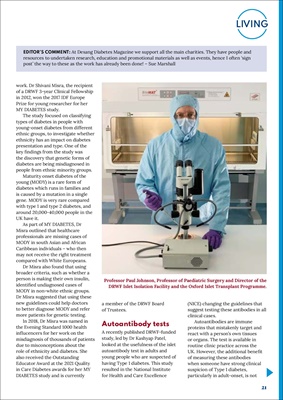
21
LIVING
EDITOR'S COMMENT: At Desang Diabetes Magazine we support all the main charities. They have people and
resources to undertaken research, education and promotional materials as well as events, hence I often 'sign
post' the way to these as the work has already been done! - Sue Marshall
work. Dr Shivani Misra, the recipient
of a DRWF 3-year Clinical Fellowship
in 2012, won the 2017 IDF Europe
Prize for young researcher for her
MY DIABETES study.
The study focused on classifying
types of diabetes in people with
young-onset diabetes from different
ethnic groups, to investigate whether
ethnicity has an impact on diabetes
presentation and type. One of the
key findings from the study was
the discovery that genetic forms of
diabetes are being misdiagnosed in
people from ethnic minority groups.
Maturity onset diabetes of the
young (MODY) is a rare form of
diabetes which runs in families and
is caused by a mutation in a single
gene. MODY is very rare compared
with type 1 and type 2 diabetes, and
around 20,000-40,000 people in the
UK have it.
As part of MY DIABETES, Dr
Misra outlined that healthcare
professionals are missing cases of
MODY in south Asian and African
Caribbean individuals - who then
may not receive the right treatment
compared with White Europeans.
Dr Misra also found that using
broader criteria, such as whether a
person is making their own insulin,
identified undiagnosed cases of
MODY in non-white ethnic groups.
Dr Misra suggested that using these
new guidelines could help doctors
to better diagnose MODY and refer
more patients for genetic testing.
In 2018, Dr Misra was named in
the Evening Standard 1000 health
influcencers for her work on the
misdiagnosis of thousands of patients
due to misconceptions about the
role of ethnicity and diabetes. She
also received the Outstanding
Educator Award at the 2021 Quality
in Care Diabetes awards for her MY
DIABETES study and is currently
a member of the DRWF Board
of Trustees.
Autoantibody tests
A recently published DRWF-funded
study, led by Dr Kashyap Patel,
looked at the usefulness of the islet
autoantibody test in adults and
young people who are suspected of
having Type 1 diabetes. This study
resulted in the National Institute
for Health and Care Excellence
Professor Paul Johnson, Professor of Paediatric Surgery and Director of the
DRWF Islet Isolation Facility and the Oxford Islet Transplant Programme.
(NICE) changing the guidelines that
suggest testing these antibodies in all
clinical cases.
Autoantibodies are immune
proteins that mistakenly target and
react with a person's own tissues
or organs. The test is available in
routine clinic practice across the
UK. However, the additional benefit
of measuring these antibodies
when someone have strong clinical
suspicion of Type 1 diabetes,
particularly in adult-onset, is not